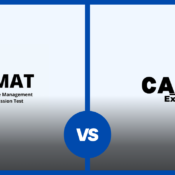
MBA in Canada: Your Gateway To Your Canadian Dream!
Increasing challenges around US immigration have resulted in a far greater number of students seriously exploring their MBA in Canada in recent years. A liberal immigration policy coupled with its diverse society and safe cities have made Canada the default education destination for many international students. While there are hiring constrains in the local Canadian job markets, many immigrants prefer having a long-term visibility on their personal and professional lives over short term remunerative benefits. These trends in business education have pushed Canadian Business Schools to enhance their engagement with prospective students and at times they are competing head-to-head with their US counterparts and often wining the pitch. This trend is likely to increase in the coming years making the Canadian MBA a lot more desirable to international students.
It is a well-known fact that Canadian Business Schools have gained immense popularity in the past couple of years due to their extensive curriculum, international exposure, diverse classes, and industry engagements. Additionally, they have a lower fee structure and a GMAT requirement (between 520 to 720) than many top American Business Schools. The country is home to over 40 MBA programs which offer world class education and degrees with international recognition for opportunities within and outside Canada. The destination’s popularity and preference can be gauged from the fact that about 2 Lakh students went to Canada last year alone, and this number is set to increase year-on-year as the local job market deepens and schools expand their outreach efforts.
Some key features of Canada’s business education market
- The learning and specialization opportunities are endless regardless of whether one wants a degree in Finance, Economics, General Management, International Business, Entrepreneurship, or Supply Chain. The universities are strong when it comes to research and teaching methods. You can be assured that you will be learning from the best.
- Home to some highly ranked business schools. For example, take the ranking as per QS 2023 ranking:
| S.No. | University | QS 2023 Ranking |
| 1. | McGill University | 31 |
| 2. | University of Toronto | 34 |
| 3. | The University of British Columbia | 47 |
| 4. | University of Montreal | 116 |
| 5. | McMaster University | 152 |
- While the cost of education varies per college, the average first-year MBA in Canada costs an average of INR 25.96 lakhs, which is substantially lower than its American counterparts. A two-year MBA from Stanford will for example cost you over INR 2 crores in tuition alone.
- Another feather in Canada’s cap is the average cost of living, which averages around INR 12.5 lakhs annually. The living cost varies as per the lifestyle and living destination of the candidate.
- The country has immense scholarship opportunities for international students. Some of these include Narotam Sekhsaria’s Scholarships, K.C. Mahindra Scholarships For Post-Graduate Studies Abroad, Hani Zeini Scholarship, Erasmus Mundus Joint Masters scholarships, Central Sector Scheme of National Overseas Scholarship for SC etc. candidates- (All countries except UK), Ritchie-Jennings Memorial Scholarship Program, Dr. Jade Malay High Achiever Scholarship, GyanDhan Scholarship, QS Scholarship For Academic Excellence, Golden Key Graduate Scholar Award, Ontario Graduate Scholarship- Other Master Programs, Jane M Klausman Women in Business Scholarship, etc. The list goes way beyond the ones mentioned!
- Schools lay heavy emphasis on extracurricular activities across interests. Canadians appreciate sports, painting, literature, theatre, etc. Students also work as volunteers in the city for social causes. You are also allowed to hold paid employment as a foreign national for 20 hours a week, and unlimited hours during holidays.
- Most top cities like Toronto have a significant chunk of Indian population. This makes it easier for Indian students to adjust culturally. The people are generally perceived to be polite and welcoming to foreign nationals, be it in college or outside.
- Post study visa for work is granted for three years, especially for those who are graduating from business programs. The minimum course length requirement is 8 months before a work visa is granted. The employers include KPMG, Deloitte, American Express, IBM, E&Y, Microsoft, Amazon, PWC, Siemens, IBM, P&G, SONY, Walmart, etc.
- Canada has a work permit for international students which is called the Post Graduation Work Permit (PGWP). Unlike the US H1B, this permit is not sponsored by your employer but is in fact an open work permit. The duration of PGWP is usually the same duration as your study permit and can vary from 1 to 3 years. The work experience you earn during a PGWP will help you earn CRS points (the next step in your application journey to your Canadian PR).
Related Read: Is Hiring An MBA Consultant Worth It?
Here are some of the top universities in Canada for you to consider:
| S.No. | College | Fees in INR/year | Average GMAT |
| 1. | Toronto (Rotman) | 39.42 Lakhs | 674 |
| 2. | Western (Ivey) | 67.4 Lakhs | 670 |
| 3. | McGill (Desautels) | 46.8 lakhs | 675 |
| 4. | Queen’s (Smith) | 8.03 Lakhs | 654 |
| 5. | York (Schulich) | 34.8 Lakhs | 660 |
| 6. | UBC (Sauder) | 20.1 Lakhs | 650 |
| 7. | Alberta School of Business | 35 Lakhs | 630 |
| 8. | Concordia (John Molson) | 29.7 Lakhs | 640 |
| 9. | HEC Montréal | 36.7 Lakhs | 630 |
| 10. | Dalhousie (Rowe) | 19.6 Lakhs | 598 |
The fee structure for the above colleges can be pressing for many, which is why we have listed some affordable options below:
| S.No. | Colleges | Fees in INR/year |
| 1. | Memorial University of Newfoundland St. John’s | 5,22,600 |
| 2. | University of Northern British Columbia Prince George | 1,90,000 |
| 3. | University of Manitoba Winnipeg | 16,14,000 |
| 4. | University of Saskatchewan | 2,63,000 |
| 5. | Saint Mary’s University Halifax | 15,07,200 |
| 6. | University of Ottawa | 9,84,00 |
| 7. | University of Waterloo | 9,87,000 |
| 8. | University of New Brunswick | 6,70,900 |
Even affordable colleges can get lighter on the pocket if one applies to and can secure scholarships.
At the same time, one should keep in mind that like in every country, there is a downside to studying there. Here are a few when it comes to Canada:
- While the average cost of living is low when compared to other countries, it can still be expensive in locations like Toronto.
- The weather is extremely unfriendly, especially in winter when temperatures can fall down to minus 7 degrees during the peak in a place like Toronto. If living in a warm place is a necessity for you then Canada might not be the right option.
- Securing a job is your responsibility, which is true for universities in other countries too. This is not the case with Canada. You will have to take major initiatives on your own, and while the career team will help you with the resources and websites, it is up to the student to take the initiative.
- The idea of prestige is still associated with old-school ivy league, and some other American universities, while Canada is a relatively new kid on the block. However, placements are still very good in Canada, and at par with its American counterparts.
Recommended Read: 1-year Vs 2-year MBA Programs – Which should you choose?
We hope this gave you some idea about the Canadian MBA structure, and what factors to look at while deciding your business school destination. While there are pros and cons to any destination, it is always favorable to look at the business school from a long-term perspective as a career move with heavy returns.
A professional MBA consultant in India can help you reach your goals, please feel free to schedule a one-on-one meeting. We look forward to hearing from you and helping you make your MBA journey more easy and guided.



